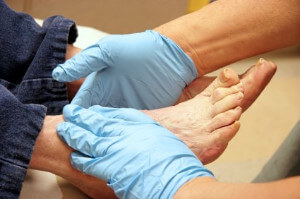
An elevated blood sugar level in the body may lead to a condition known as diabetes. It can damage the nerves in the feet and it can be difficult to feel existing cuts, bruises, or scrapes. An infected cut on the bottom of the foot could evolve into a foot ulcer, and the foot may have to be amputated if it is not promptly treated. It is important to perform proper diabetic foot care and this is done by using a mirror to check the bottom of the feet. Additionally, when the feet are washed and dried thoroughly, they will generally feel better. This can be followed by trimming the toenails straight across instead of curved. Many diabetic patients understand the importance of refraining from walking barefoot and this is an added measure in protecting the feet. Shoes are to be worn with socks that are well-padded and both need to be comfortable and fit properly. It is beneficial to purchase shoes at the end of the day when the feet are at their largest. Patients who have diabetes are suggested to be under the care of a podiatrist who can help them properly treat and manage their foot care issues.
Diabetic foot care is important in preventing foot ailments such as ulcers. If you are suffering from diabetes or have any other concerns about your feet, contact the podiatrists from Boston Common Podiatry. Our doctors can provide the care you need to keep you pain-free and on your feet.
Diabetic Foot Care
Diabetes affects millions of people every year. The condition can damage blood vessels in many parts of the body, especially the feet. Because of this, taking care of your feet is essential if you have diabetes, and having a podiatrist help monitor your foot health is highly recommended.
The Importance of Caring for Your Feet
- Routinely inspect your feet for bruises or sores.
- Wear socks that fit your feet comfortably.
- Wear comfortable shoes that provide adequate support.
Patients with diabetes should have their doctor monitor their blood levels, as blood sugar levels play such a huge role in diabetic care. Monitoring these levels on a regular basis is highly advised.
It is always best to inform your healthcare professional of any concerns you may have regarding your feet, especially for diabetic patients. Early treatment and routine foot examinations are keys to maintaining proper health, especially because severe complications can arise if proper treatment is not applied.
If you have any questions please feel free to contact our office located in Boston, MA . We offer the newest diagnostic and treatment technologies for all your foot and ankle needs.









